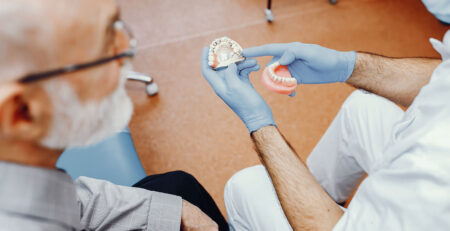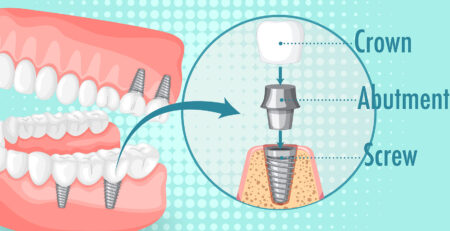Can You Get Dental Implants if You Have Gum Disease? Exploring Your Options
Dental implants have revolutionized tooth replacement, offering a durable and natural-looking solution for missing teeth. However, if you suffer from gum disease, you may be wondering if dental implants are still an option for you.
This article explores the relationship between gum disease and dental implants, examines the treatment process, and highlights key considerations to help you make an informed decision about your oral health.
Understanding Gum Disease and Its Impact on Dental Implants
What is Gum Disease?
Gum disease, also known as periodontal disease, is a common oral health condition that affects the tissues surrounding and supporting the teeth.
It begins with gingivitis, an inflammation of the gums, and can progress to periodontitis, where the infection causes damage to the bone and tissue supporting the teeth. Symptoms of gum disease include:
- Red, swollen, or bleeding gums
- Persistent bad breath
- Receding gums
- Loose or shifting teeth
If left untreated, gum disease can lead to tooth loss and impact overall oral health.
The Relationship Between Gum Disease and Dental Implants
Dental implants are designed to replace missing teeth by inserting a titanium post into the jawbone, which acts as a new tooth root.
The success of dental implants relies heavily on the health of the surrounding bone and gum tissue. Therefore, existing gum disease can pose significant challenges:
- Bone Loss: Gum disease often leads to bone loss in the jaw, which is crucial for the stability of dental implants. Without sufficient bone density, implants may not properly integrate with the jawbone, increasing the risk of implant failure.
- Gum Health: Healthy gums are essential for the long-term success of dental implants. If gum disease is present, it can compromise the healing process and increase the risk of complications such as infection or inflammation around the implant site.
- Healing and Integration: The healing process for dental implants requires a stable and healthy environment. Gum disease can interfere with the healing process, making it more difficult for the implant to integrate with the jawbone.
Can You Get Dental Implants if You Have Gum Disease?
The presence of gum disease does not automatically disqualify you from getting dental implants. However, it does require careful management and treatment to ensure the best possible outcome. Here’s a closer look at how you can still get dental implants even if you have gum disease:
1. Addressing Gum Disease Before Implant Placement
The first step in getting dental implants if you have gum disease is to address and manage the condition. This typically involves:
- Professional Cleaning: A thorough cleaning by a dental professional can remove plaque and tartar buildup from below the gumline, helping to reduce inflammation and improve gum health.
- Scaling and Root Planing: This deep cleaning procedure removes plaque and tartar from the tooth roots and smooths out rough areas, making it harder for bacteria to accumulate.
- Antibiotics: In some cases, antibiotics may be prescribed to help control bacterial infections and reduce inflammation.
- Surgical Treatment: If the gum disease has caused significant damage, surgical procedures may be needed to repair the gum tissue and restore oral health.
Once your gum disease is under control and your gums are healthy, you may be considered a candidate for dental implants. Your dentist or oral surgeon will assess your overall oral health and the condition of your jawbone before proceeding.
2. Bone Grafting for Insufficient Bone
If gum disease has resulted in significant bone loss, a bone graft may be necessary to create a stable foundation for dental implants. Bone grafting involves:
- Adding Bone Material: Bone graft material is placed in the areas where bone loss has occurred. This material can be taken from your own body, a donor, or synthetic sources.
- Healing Time: The grafting material integrates with the existing bone over several months, allowing for the development of new bone growth.
- Implant Placement: Once sufficient bone has been restored, dental implants can be placed. The grafted bone provides the necessary support for the implants to properly integrate with the jawbone.
3. Choosing the Best Dental Implants in Delhi
Finding the right dental clinic is crucial for successful implant placement, especially if you have a history of gum disease. When searching for the best dental implants in Delhi, consider the following:
- Expertise and Experience: Look for clinics with experienced oral surgeons or periodontists who have successfully treated patients with gum disease.
- Technology and Techniques: Advanced technology, such as 3D imaging and computer-guided implant placement, can enhance the accuracy and success of dental implants.
- Patient Reviews and Testimonials: Check reviews and testimonials from other patients to gauge the clinic’s reputation and success rate.
4. Cost Considerations
The cost of dental implants can vary based on several factors, including the complexity of the case and the clinic’s location.
The single tooth implant cost in Delhi may range from affordable to premium, depending on the materials used and the expertise of the dental team. It’s important to discuss the cost with your dental clinic and understand what is included in the price.
5. Long-Term Maintenance and Care
After successful implant placement, maintaining good oral hygiene is crucial to prevent gum disease and ensure the longevity of your implants. This includes:
- Regular Brushing and Flossing: Brush and floss daily to keep your teeth and gums clean and free from plaque.
- Routine Dental Checkups: Visit your dentist regularly for checkups and professional cleanings to monitor the health of your gums and implants.
- Healthy Lifestyle: Avoid smoking and maintain a healthy diet to support oral health and overall well-being.
Highlighting Key Considerations for Dental Implants with Gum Disease
Dental Clinic Selection
Choosing the right dental clinic is essential for successful implant treatment. Look for clinics with a strong track record in handling cases with gum disease. A reputable dental clinic will offer comprehensive evaluations, personalized treatment plans, and advanced technology to ensure the best outcomes.
Cost of Single Tooth Implants in Delhi
Understanding the single tooth implant cost in Delhi is important for budgeting and planning. While prices can vary, investing in high-quality implants and experienced professionals can lead to better long-term results. Be sure to discuss all potential costs and payment options with your dental clinic.
Comprehensive Treatment Plan
A comprehensive treatment plan is vital for addressing both gum disease and implant placement. This plan should include:
- Pre-Implant Treatment: Managing gum disease and any additional procedures needed, such as bone grafting.
- Implant Placement: The procedure itself, including the type of implant and materials used.
- Post-Implant Care: Follow-up visits and ongoing maintenance to ensure the health of your implants and surrounding tissues.
Conclusion
While gum disease can present challenges for getting dental implants, it is not necessarily a barrier. With proper management and treatment, many patients with a history of gum disease can successfully receive dental implants and enjoy the benefits of a restored smile.
Addressing gum disease before implant placement, considering bone grafting if needed, and choosing the best dental clinic are crucial steps in the process. By focusing on these key factors and understanding the costs associated with single tooth implant procedures in Delhi, you can make an informed decision about your oral health.
If you are considering dental implants and have concerns about gum disease, consult with a qualified dental professional to explore your options and develop a treatment plan that meets your needs. With the right care and attention, you can achieve a healthier, more confident smile with dental implants.





Leave a Reply